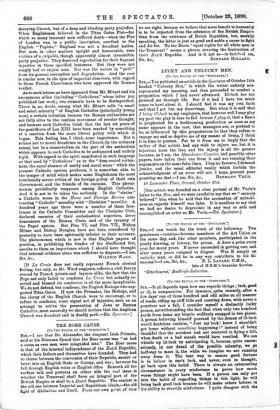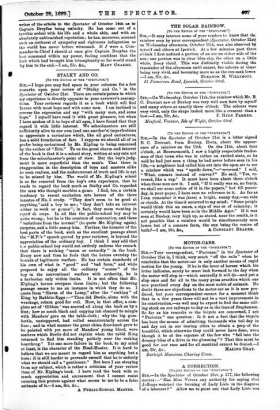[TO THE EDITOR OF THE "SPECTATOR:] Ste,—It all depends upon
bow one regards things ; luck, good or ill, is comparative. For instance, quite recently, after a few days' run of three hundred and odd miles on all manner of roads, riding up stiff hills and coasting down, with never a puncture nor a fall, I consider myself a distinctly lucky person, notwithstanding the fact that when only two hundred yards from home my bicycle suddenly snapped in two pieces. A person believing himself pursued by the demon of ill-luck would doubtless exclaim, " Just my luck knew I shouldn't get home without something happening!" instead of being thankful that the accident had not occurred in flying a hill, when death or a bad smash would have resulted. We can whistle up ill-luck by anticipating it, because, quite unoon- sciously, in our dread of the possible calamity, we go half-way to meet it, the while we imagine we are running away from it. The beet way to ensure good fortune is to believe in one's luck, and never, even in thought, go back upon this belief. There is always an extenuating circumstance in every misfortune to prove how much worse things might have been. If a person can only get into the habit of regarding things in this light, he will bring back good luck because he will make others believe in his ability to Override misfortune. I quite disagree with the
writer of the article in the Spectator of October 14th as to Captain Dreyfus being unlucky. He has come out of a terrible ordeal with his life and a whole skin, and with an absolutely unblemished reputation ; he has, moreover, aroused such an outburst of sympathy and righteous indignation as the world has never before witnessed. If I were a Com- mander-in-Chief I should at once give Captain Dreyfus the best command within ray power, feeling confident that the luck which had brought him triumphantly so far would stand
by him to the end.—I am, Sir, Lc., MARY GRAEME.







































 Previous page
Previous page